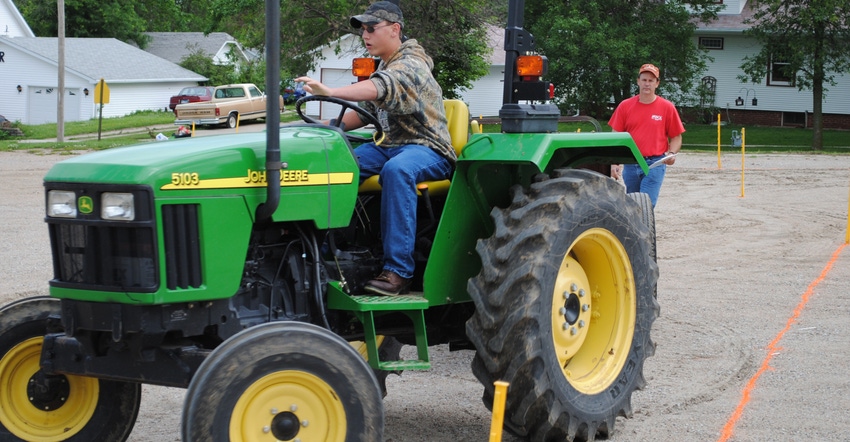
You’ve heard the slogan a thousand times, “Don’t text and drive.” This is good advice not only for those driving cars, but also for those operating tractors, farm trucks and other farm equipment such as combines and high-clearance machines.
Linda Emanuel, Agrisafe Network community health director, notes the dangerous nature of operating farm equipment and texting. The size, weight and lack of maneuverability of heavy equipment and trucks can lead to fatal crashes, just as with smaller motor vehicles, but truckers and farm equipment operators have to do multiple tasks while driving. This makes them more susceptible to causing or being involved in an crash if they are distracted.
Emanuel says that Federal Motor Carrier Safety Administration (FMCSA) research shows the odds of being involved in a safety-critical event, which would include a crash, near-crash or unintentional lane deviation, are 23.2 times greater for truck drivers, for instance, who text while driving than for those who don’t. These results could be extrapolated to farm equipment operators as well.
In addition to safety-critical events, farm equipment operators could run over obstacles if they are distracted, which could tip a tractor on its side. Other hazards include children running around the farm or muddy surfaces with many cross slopes that can cause drifting and skidding laterally when braking.
Tractor rollovers are a serious concern. “This type of crash can occur anywhere, but it is most common when the tractor is turning, driving near steep slopes or driving near the edge of the road,” Emanuel explains. “A rollover can occur when the farmer is shifting gears or slamming on the brakes, especially if the roads are slippery due to rain, snow or ice.”
Tips to stop the text
It is so tempting to answer that quick text, just for a second, while driving a tractor or combine, so there are steps farm operators can take to avoid that temptation altogether, Emanual says. Garnering information from the “No Texting Rule Fact Sheet” from FMCSA, she says you can place your cellphone in the glove box of your truck or in a secure location in the tractor or combine where it is out of reach.
“Turn your cellphone off, put it on silent or on ‘do not disturb,’” she adds. “You can also download or utilize apps that block phone usage while driving, including TextLimit, Cellcontrol or Live2Txt, as examples. These apps help block certain features on your phone, whether it be emails, texts, phone calls or any other notifications for social media.
“There is always the option to mute notifications without an app by using settings to disable notifications or muting texts and phone calls by locating someone’s information that you’d typically get notifications from.”
Teens and texting
It is important for parents and adult supervisors to set a good example of no texting while operating equipment or driving.
“Test the teens on how all controls operate, use safety features, consider what protective gear and training your teen needs in general on the equipment, and purchase what is age- and size-appropriate,” Emanuel suggests. “Make sure to complete routine maintenance checks and have teens who are operating equipment read and follow operating instructions.”
These are basic safety tips everyone should follow, but they apply along with the texting rules.
In addition to these safety measures, parents should do a maintenance check before young people operate a piece of equipment, and make sure tools and equipment are all in working order. “Broken or poorly working equipment increases the risk of crashes or injury,” Emanuel says.
Local Extension resources, Farm Bureau and other farm agencies often offer safe tractor-driving courses for youth, to teach safe farming techniques and the proper ways to use age-appropriate equipment.
Each summer, Nebraska Extension offers tractor safety training open to students ages 13 and older. Nebraska FFA also supports tractor-driving contests to promote safe operation of farm equipment.
Keeping tasks age-appropriate is one way to keep youth on the farm safe. According to Emanuel, various state and federal laws often dictate which jobs — including driving tractors, combines and other pieces of farm equipment — are appropriate for specific ages.
No matter the age of the farm equipment operator, texting while driving can kill the operator or someone driving along the road near the farm equipment. Research points clearly to the advanced risks of texting while driving farm equipment, along with any other distraction that takes the eyes and mind off the road. There are multiple resources available where you can learn more, including the No Texting Rule Fact Sheet at fmcsa.dot.gov.
In addition, Nebraska Extension, Central States Center for Ag Safety and Health and AgriSafe are planning a new, hands-on youth farm safety day on May 24 at the Nebraska Extension West Central Research and Education Center at North Platte, and on May 26 at Raising Nebraska at Fonner Park and the Nebraska State Fairgrounds in Grand Island.
About the Author(s)
You May Also Like






